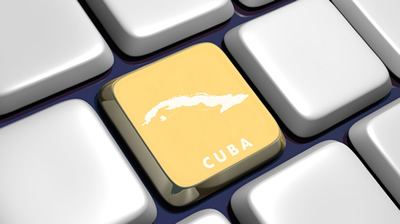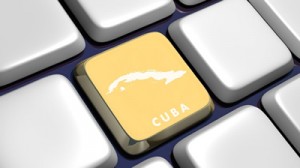
The never-ending story
By Jorge de Armas
I met Carlos García Pérez, director of Radio Martí, in December 2011. Not out of my own initiative but because of someone who hired my services.
Whosoever wishes to discover how abject the use of the word “Cuba” for personal profit can be should work for a while close to the leaders of the historic exile, the presidents of associations, editors of newspapers, deans of journalism schools, chiefs of assault brigades, Presidents of Cuba in Exile, everyone who, in the name of love for Cuba, slaps a title in front of his name and lives off the ephemeral glory purchased with the millions of dollars available to “liberate” our island.

I met Carlos García in his office at Radio Martí. The person I went with had asked me to put together an interview with [Lady in White] Sara Marta Fonseca, using some footage brought out of Cuba (super secretly) in a cell phone. Alleging technical ignorance, he asked me to be present at the meeting.
García – who at the time had not yet become involved in the raffle of motorcycles that were never delivered to the island or had ranted against Cardinal Jaime Ortega (which almost cost him his job) – is a courteous and well-educated man who occasionally spouts Cuban sayings he learned from his family. He is a Cuban-American who is pleasant, not petulant, although a bit arrogant.
He looked at the stuff, liked it, and told my client, “We’re preparing a big project. We want to flood Cuba with flash drives with news, videos, interviews, denouncing the repression and encouraging a popular uprising. But we have to be smart. We cannot speak only about the dissidents or the Castros; we have to send music, movies, we have to change the strategy.
“The idea is that [the Cubans] can have an Internet outside the Internet. It’s got to be constantly updated, comparing what they’re experiencing with what is happening in the world. And this video you bring us is very good for our project.”
I remembered all this after reading the article in El Nuevo Herald about “Connect Cuba,” written by Juan Tamayo, that describes that Radio Martí project I heard about two years ago.
“Connect Cuba” is surprising for several reasons. It is a continuation, in the tech era, of the program that used to distribute information in Cuba through the USINT [U.S. Special Interests Section] in news summaries sent to artists, intellectuals and selected personages in Cuban society. It was inherited from the first Radio Martí; before that, from the Cuban Service of the Voice of America.
The project is based on an idea as old as it is ineffective. It is odd that it is sponsored by the Cuban American National Foundation at a time when the Foundation has lost support and influence to the Cuban Liberty Council.
What is neither odd nor surprising is that everything arises from a single idea: to collect money ($35,000 and counting) “to pay for the initial cost of the campaign, such as the website and its design.” According to the CANF, “the campaign will be announced on Nov. 8, during the annual fundraising for the Foundation.”
In other words, money, money and more money.
At that meeting with Carlos García Pérez – to which I was taken (I later learned) to show him that there was “young blood” in the Cuban opposition – my client told him, “I need you to help me. In 2013, I’ll celebrate the 50th anniversary of my organization. Maybe you’ll do a story on us, or something like that.”
To which Carlos answered: “In 2013? That anniversary we’ll broadcast from Cuba.”
As utopian an answer as the project.
Cuba needs to be connected, but not through projects that become “plans against.”
About Cuba and its access to the Internet, several theories have been posited.
The most commonly accepted is that of government cyberphobia. There is no mass access to the Internet because the Cuban authorities don’t allow the free flow of information. Beyond the logical controls and defense systems necessary because of the harassment Cuba is exposed to, this theory lacks solid foundations, both technical and political.
It is the government of the United States which sponsors and develops projects like “Connect Cuba” or paralegal networks of access to the Internet, such as the one that subcontractor Allan Gross tried to develop on the island. Washington also generates figures that utilize technological support to attack Cuba and simultaneously maintains a blockade that prevents Cuba from connecting to U.S. cables or satellites.
It is a cynical and perverse policy to develop alternatives to the Web while maintaining an embargo that has proved to be ineffective and is even counterproductive to the interests of the United States.
The island needs to review its policy on access to the Web, and establish a social program for computer literacy and mass education on what the Internet is and what it represents.
The economic reforms, the increase in self-employment, the new social relations, as well as the new kinds of employers and employees, the cooperatives, the small businesses, they all need systems of communication and information based on the Web.
One way to fight corruption, the shifting job picture, the intrusive and ineffective bureaucracy, and to optimize resources and speed up services is to develop systems of communication between the Cuban institutional apparatus and its immediate client, the ordinary citizen.
So long as there is a hostile policy by the U.S. government that protects the unregulated and illegal access to the Web while simultaneously preventing Cuba from legally leasing services through geographically logical suppliers, i.e., American companies or their subsidiaries, there will always be a crack that will permit projects like “Connect Cuba,” and the specter of cyberphobia will become the only reason for the scant, limited and expensive access to the WorldWideWeb.
To eliminate the blockade, or to establish a specific license by executive order that permits the normalization of commercial relations in the sphere of communications and information technology, would enable Cuba to develop the infrastructure needed to give Internet access to ever-broader sectors of the population.
The only way to expand boundaries is to eliminate pretexts, to bring together wills, seek roads, eliminate reasons for conflict and normalize a neighborly relation. Publicly and repeatedly, Cuba has shown it wants to dialogue. Cubans here in Florida, well, they keep Carlos García Pérez in business and invent something they call “Connect Cuba.”
Jorge de Armas is a Cuban living in Miami. He collaborates with various media outlets in Cuba and the United States. He is a member of the group CAFE.
Progreso Semanal/ Weekly authorizes the total or partial reproduction of the articles by our journalists, so long as source and author are identified.

